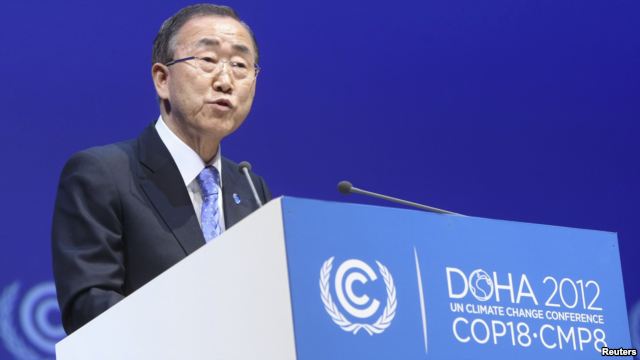UN Chief: Extreme weather is 'New Normal'

United Nations Secretary-General Ban Ki-moon says extreme
weather conditions are "the new normal" and now is the time for
governments to take action to prepare for the danger, Radio Liberty
reported.
Ban spoke to national delegations meeting in Qatar to try to agree
on a new treaty to cut greenhouse-gas emissions linked to climate
change.
In his address on December 4, Ban said a thaw in Arctic sea ice to
record lows, "superstorms," and rising sea levels were all
indicators of a crisis.
He said signs of climate change were everywhere, noting droughts
"from the United States to India, from Ukraine to Brazil."
"Danger signs are all around," Ban said. "One-third of the world's
population lives in countries with moderate to high water stress.
Land degradation affects 1.5 billion people. Ice caps are showing
unprecedented melting, permafrost is thawing, sea levels are
rising. The abnormal is now the new normal."
The UN chief said no one on Earth will be immune from climate
change.
"It is an existential challenge for the whole human race, our way
of life, our plans for the future," he said. "We must take
ownership. We collectively are the problem, then we should have the
solutions."
Ban said Superstorm Sandy, which hit the Caribbean and the East
Coast of the United States one month ago, causing deaths and
widespread destruction, should be a wake-up call that it's past
time for action.
A minority of scientists continue to question whether the global
warming and weather events of recent decades are due to human
activities, such as the burning of fossil fuels, which create
carbon emissions.
The Doha talks on agreeing on an extension of the Kyoto Protocol
are due to end December 7. The nearly two weeks of talks have so
far failed to show many results.
Delegates say the failure so far to agree on an extension of Kyoto
is hampering efforts to make progress toward a new treaty that
would commit nations to firm cuts in emissions beginning in 2020.
This new treaty is meant to be agreed upon by 2015.
Failure to extend the Kyoto pact, which expires at the end of this
year, would leave the world without a binding United Nations
framework for cutting emissions.
Wealthier countries and developing countries are still deeply
divided on how much emissions should be cut in which countries, and
how much richer countries should provide in aid to poorer countries
to fund emissions reductions.
Kyoto, agreed on in 1992, required industrialized countries to cut
their greenhouse-gas emissions by an average of 5.2 percent below
1990 levels between 2008 and 2012.
Russia, Japan, and Canada have announced they are pulling out of
Kyoto, saying it is no longer relevant because developing countries
such as China and India refuse to accept targets for imposing
emissions limits.
The United States, the second-biggest emitter of greenhouse gases
after China, never ratified Kyoto, also citing the pact's failure
to address pollution from states like China and India.
The last attempt to negotiate a global deal to extend Kyoto, in
2009 in Copenhagen, failed to result in agreement.
Here we are to serve you with news right now. It does not cost much, but worth your attention.
Choose to support open, independent, quality journalism and subscribe on a monthly basis.
By subscribing to our online newspaper, you can have full digital access to all news, analysis, and much more.
You can also follow AzerNEWS on Twitter @AzerNewsAz or Facebook @AzerNewsNewspaper
Thank you!
